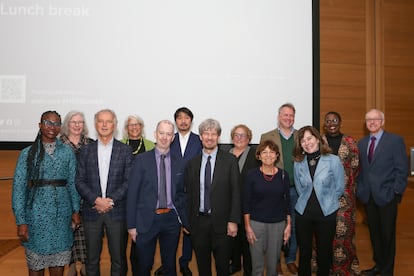The most disturbing question in science today remains unanswered: Are the first genetically modified babies okay?
The scientific community lashes out at China due to the secrecy surrounding the health of the three girls that were ‘edited’ by He Jiankui

Five years after the fact, the two biggest questions surrounding the creation of the first three humans whose genomes were modified by another human remain unanswered. How could something like this have happened without the Chinese authorities knowing about it? And even more relevant: how are the three girls who were born as a result of the outrageous experiments of He Jiankui, a scientist that was condemned by the international community and who to this day has not given any explanations?
Several hundred gene editing experts from around the world gathered this week at the Third International Summit on Human Genome Editing in London to seek answers about what happened in 2018, when the Chinese researcher attended this same forum to announce the birth of the first genetically modified babies.
Yaojin Peng, director of China’s Center for Ethics of Science and Technology and a member of the Chinese Academy of Sciences, explained the attendees that the country has passed several laws that limit the editing of the human genome. The researcher outlined the new measures, which include a new criminal offense in the Penal Code and the creation of several ethics committees to supervise research in this field. With these actions, he pointed out, the country’s laws are now in line with those of other countries, paving the way to someday explore a way to establish some form of international governance.
Neither Yaojin Peng nor Ping Yang, his counterpart from the Dalian University of Technology, agreed to answer questions from this newspaper.
Sociologist Joy Zhang, a Chinese-born researcher at the University of Kent, in the United Kingdom, warns of the problems that these laws are causing in the Asian country: “Human gene editing has become a matter of national security.” These laws, she explained, limit the export of human cells, but it is not clear which ones, and such strict limits could make it impossible for the country’s scientists to collaborate with foreign colleagues. Many scientists in the field of biomedicine have protested.
For a year, Zhang has searched for any information regarding the three babies that were born after Jiankui’s experiments. “It is a national secret,” sums up the researcher. It is not known who they are, where they are or even if they are still alive and healthy at this point. The scientist ventures: “We assume they are fine.”
This is without a doubt the most disturbing and thorny issue regarding He Jiankui’s experiments. On one hand, protecting the identity of these three girls is a priority so they can live as normal a life as possible. On the other, it is not known to what extent their health is being monitored and, above all, if their genome has been analyzed and unwanted mutations have been detected, as the gene editing technique that He Jiankui used, CRISPR, is far from perfect.
A “rogue scientist”
Months after being released from prison, He Jiankui is trying to return to scientific research, this time developing alleged affordable cures for genetic diseases. However, he is not sharing any proof of how he intends to do it, beyond some photos of patients that he shares on social media. The scientist said that he would go to London to explain everything, but backed out.
Molecular biologist Robin Lovell-Badge, organizer of the event, clarifies that He Jiankui was never invited to the conference, nor did he register to attend. What little they know about him, he said, comes from his participation in an online congress in which his attitude was “atrocious” and where he did not answer a single question about what he did.
The researcher believes that China has not given all the necessary explanations. The country was supposed to conduct a thorough investigation that would reveal the complete genetic sequence of the babies and clarify all the effects of the gene editing, but “that analysis was never done, and we still don’t know what exactly happened,” he denounces.
Contacted by this newspaper, He Jiankui declined an in-person interview, but extended an invitation to visit his “laboratory” in Beijing.

The scientists that gathered in London intend to issue a joint statement about all the questions that remain around the case and the real risks of something like this happening again, as He Jiankui is probably not the only “rogue scientist” out there, Lovell-Badge explains. The biggest concern is that other impostors sell fake cures for diseases of genetic origin, something that may already be happening in countries that lack regulations for this matter, he alerts.
Each country is responsible for regulating the gene editing of human cells, including the most delicate: that of sperm, eggs and embryos. If a pregnancy is induced by assisted fertilization with this biological material, the changes in the DNA would pass from generation to generation, altering the genetic inheritance of our species. “All we can do is publicly denounce these impostors, so that people become aware that they have no idea what they are doing,” states Lovell-Badge.
A goal too attractive to abandon
Shoukhrat Mitalipov, a researcher at the Oregon Health & Science University in the US, is one of the world’s leading experts in gene editing of human embryos. He points out that this goal is too attractive to abandon: “Our stated aim is to be able to edit human embryos to correct errors in an effective and safe way, which would in part prevent millions of children from being born with fatal or disabling hereditary diseases.” The problem, he admits, is that current gene editing techniques like CRISPR are still a long way from being viable enough to ensure they will not create new, unwanted problems. “Human embryos often reject the DNA templates that we use to edit their genome, and we don’t know why,” he points out.
This week, Mitalipov published a study in Nature Communications that adds another layer of uncertainty to gene editing. Knowing if a human embryo has a genetic defect requires taking a small sample without causing it to die, something that is already delicate. What the new work shows is that this technique, known as genome amplification, is unable to detect the unwanted DNA defects that CRISPR gene editing can leave behind, making it even more difficult to achieve safe and effective embryo editing, something that according to the researcher will probably take many more years of work.
Dieter Egli, from Columbia University, has investigated the unwanted effects of Jiankui’s editing of the CCR5 gene, supposedly done to confer immunity against the AIDS virus. This process, he found out, introduces additional errors at the chromosome level – many of them incompatible with life. The lack of information makes it impossible to know if the Chinese scientist’s gene editing actually took place or if the embryos simply rejected it and moved on; in any case, he points out, the technique is not yet safe enough to make genetically modified babies, although it is worth further investigation. Egli compares this problem with editing a book: the galleys are read and corrected before sending it to print, as it would be impossible to send individual corrections for each and every copy once it has been printed and sold. The same is true of human cells. If the few cells of an embryo are safely and effectively corrected, a disease that after birth would be impossible to avoid can be eliminated.
Lluis Montoliu, a researcher at the Spanish National Center for Biotechnology, believes that this congress was a “lost opportunity to find out exactly what happened” with He Jiankui’s experiments. “Chinese delegates have talked a lot about what the country did after the experiments, but nothing about what went on before. I think it is impossible that the authorities were not aware of what he was doing. They were willing to face a little controversy because they thought the rest of the world would follow in their footsteps, but it hasn’t, and the outrage was far greater than they could allow. I tried to ask the Chinese delegates about the girls, but my question was not accepted. They left without answering.”
Beyond the long shadow of He Jiankui, the congress also presented some success stories, such as the first cases of hereditary diseases that were cured through gene editing – in this case, using stem cells from the patient’s own blood.
Sign up for our weekly newsletter to get more English-language news coverage from EL PAÍS USA Edition
Tu suscripción se está usando en otro dispositivo
¿Quieres añadir otro usuario a tu suscripción?
Si continúas leyendo en este dispositivo, no se podrá leer en el otro.
FlechaTu suscripción se está usando en otro dispositivo y solo puedes acceder a EL PAÍS desde un dispositivo a la vez.
Si quieres compartir tu cuenta, cambia tu suscripción a la modalidad Premium, así podrás añadir otro usuario. Cada uno accederá con su propia cuenta de email, lo que os permitirá personalizar vuestra experiencia en EL PAÍS.
¿Tienes una suscripción de empresa? Accede aquí para contratar más cuentas.
En el caso de no saber quién está usando tu cuenta, te recomendamos cambiar tu contraseña aquí.
Si decides continuar compartiendo tu cuenta, este mensaje se mostrará en tu dispositivo y en el de la otra persona que está usando tu cuenta de forma indefinida, afectando a tu experiencia de lectura. Puedes consultar aquí los términos y condiciones de la suscripción digital.









































